Programas de transferencias monetarias sectoriales
Los PTM pueden ayudar a las personas en situaciones de crisis a abordar sus necesidades dentro de un determinado sector humanitario, tales como: agua, alimentos, salud, vivienda, medios de vida, o protección. Los PTM sectoriales pueden ser restringidos o sin restricción, condicionales o incondicionales, y normalmente serán proporcionados como parte de un paquete integral que puede incluir asistencia en especie o servicios.
Cada sector tiene que considerar distintas preguntas, retos, ventajas y riesgos cuando se trata de apoyar la recuperación de las personas dentro de su área de especialización. Esto requiere evidencias, herramientas, orientación y capacidad. Para cumplir los resultados sectoriales a través de los PTM también se requiere de una comprensión multisectorial de las necesidades y de la seguridad económica de los hogares (vea las Transferencias monetarias multipropósito). Mientras que algunos sectores tienen mucha experiencia en la implementación de los PTM y lo han hecho por muchos años, otros se están poniendo al día. La mayoría de los sectores humanitarios están comprometidos y han venido aumentando sus esfuerzos en los PTM sectoriales. El Grupo global de coordinación de clusters (GCCG, por sus siglas en inglés) también se encuentra coordinando el trabajo entre clusters para mejorar la utilización sectorial de los PTM.
Prioridades actuales
La CALP Network trabaja en estrecha colaboración con los grupos técnicos de asistencia en efectivo y equipos de tareas dentro de los clusters globales, que han estado definiendo sus prioridades y planes de trabajo del 2020 durante sus reuniones regulares. Una descripción general y detalles específicos de estas prioridades en cada cluster global está disponible aquí.
Subpáginas de los PTM sectoriales
-
Coordinación y gestión de campamentos y programas de transferencias monetarias
-
Educación y programas de transferencias monetarias
-
Seguridad alimentaria y programas de transferencias monetarias
-
Salud y programas de transferencias monetarias
-
Nutrición y programas de transferencias monetarias
-
Protección y programas de transferencias monetarias
-
Alojamiento y programas de transferencias monetarias
-
Agua, saneamiento e higiene (WASH) y programas de transferencias monetarias
Contenido destacado
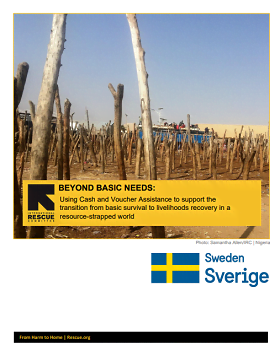
Beyond Basic Needs: Using Cash and Voucher Assistance to Support the Transition from Basic Survival to Livelihoods Recovery in a Resource-Strapped World
Guidelines and Tools
Do you think of yourself as a “cash” person OR as a “livelihoods” person? An “emergency” practitioner OR a “recovery” practitioner? Or do you find yourself unsatisfied with the often narrow implications of these terms? We’ll never have enough funding to provide basic needs support to everyone who needs it for the entire time they are in need, even if we take advantage of the...

Looking into 2020: short overview on global clusters, CVA and the CALP Network
Presentation
Overview as 2020 begins:
• Significant progress and commitment from all global clusters on integration of CVA into their work.
• Significant interest in different regions and by some donors on sector-specific CVA.
• Challenges that remain:
o Dialogue: 1) Ensuring CVA specialists understand sector specificities and successfully bank on the technical expertise emanating...

Building Evidence to inform the Effective Use of CASH and Voucher Assistance in Emergency Sanitation and Hygiene Programming
Report
An analysis of 5 case studies of utilization of CASH/Voucher Assistance are presented and analysed in the attempt of building evidence on their utilization in emergency WASH Sanitation and HP programming. Findings and recommendations are provided on Coordination, Situation and Response Analysis, Program Design, Implementation, Monitoring and Evaluation.
Últimos recursos
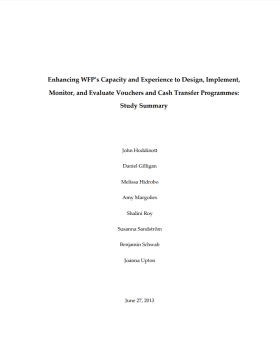
Enhancing WFP’s Capacity and Experience to Design, Implement, Monitor, and Evaluate Vouchers and Cash Transfer Programmes: Study summary
Report
With support from the Government of Spain, and in partnership with the World Food Programme (WFP), researchers from the International Food Policy Research Institute (IFPRI) evaluated four pilot projects to assess the comparative performance of cash transfers, food payments, and vouchers on household food...
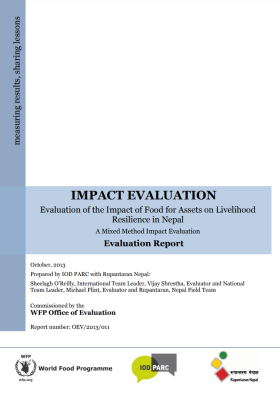
Impact Evaluation: Evaluation of the impact of food for assets on livelihood resilience in Nepal
Report
This evaluation, conducted by an independent team between January and July 2013, assessed the outcomes and impacts of the food-for-assets (FFA) components of two WFP programmes in Nepal: country programme (CP) 100930 (2002–2007) and protracted relief and recovery operation (PRRO) 106760 (2007–2010)....
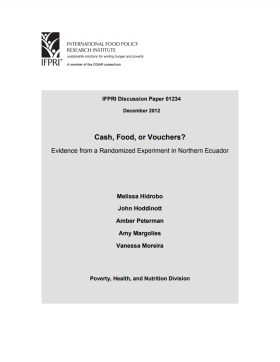
Cash, Food, or Vouchers? Evidence from a randomized experiment in Northern Ecuador
Report
The debate over whether to provide food assistance and the form that this assistance should take has a long history in economics. Despite the ongoing debate, little rigorous evidence exists that compares food assistance in the form of cash versus in-kind. This paper uses a randomized evaluation in...
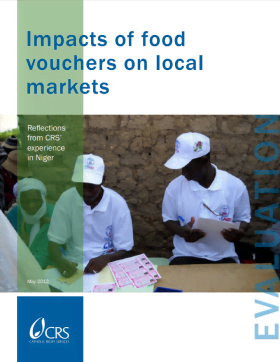
Impacts of Food Vouchers on Local Markets: Reflections from CRS’ experience in Niger
Report
In mid 2010, CRS-Niger designed and carried out a food voucher program to assist the most needy one-third of households in the departments of Ouallam and Tillabéri due to the poor harvest in 2009 (CRS, 2010). The ADVANCE project was implemented in collaboration with a local NGO partner Association pour...

Kenya – Cash Grants to Support Post-Election Violence Livelihood Recovery
Case Study
In response to post-election violence starting in late December 2007, ACF implemented a cash-based intervention in Nakuru, South Rift Valley, Kenya. This programme supported the local displaced and host population, who had been excluded from aid provided to internally displaced persons (IDPs) living in...
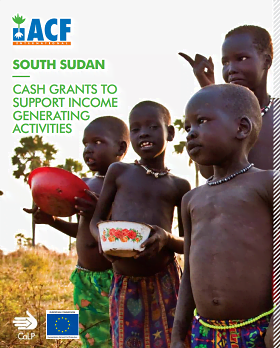
South Sudan – Cash Grants to Support Income Generating Activities
Case Study
In response to chronic malnutrition, ACF implemented a cash-based intervention in Twic and Gogrial West Counties of Warrap State, South Sudan, using group cash grants to promote income generating activities. The programme addressed chronic livelihood vulnerability, which is a contributing factor to global...

USAID Guidelines for Proposal
Report
USAID’s Office of U.S. Foreign Disaster Assistance (USAID/OFDA) has revised its Guidelines for Proposals in accordance with updated USAID requirements and the changing global humanitarian context in 2012. These Guidelines apply to new awards as well as to modifications of existing awards. The...

Meta-Evaluation of ACF Fresh Food Voucher Programmes
Report
ACF commissioned a meta-evaluation of 5 of its fresh food voucher programmes implemented between 2009-2011 during emergencies in Bolivia, Dadaab refugee camps in Kenya, Haiti, Pakistan and the occupied Palestinian Territories (oPT). The programmes were all paper cash-vouchers exchanged for fresh foods in...
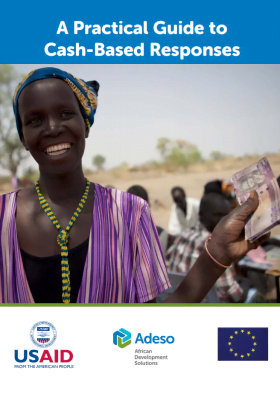
A Practical Guide to Cash-Based Response
Guidelines and Tools
A Practical Guide to Cash-based Responses is a manual developed by Adeso to share the organisation’s experience in developing and implementing appropriate cash-based responses. The manual highlights some practical problems that are faced by implementation teams around the world and it is intended to...
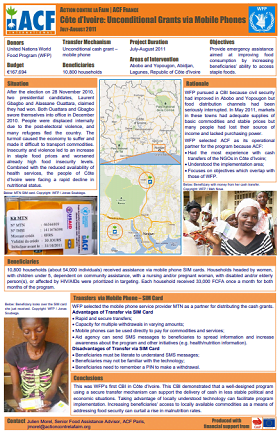
ACF Côte d’Ivoire: Unconditional Grants via Mobile Phones (Poster)
Report
This one-pager (poster) provides an overview of ACF’s experience transferring cash by mobile phone in the Ivory Coast (a WFP programme).

ACF Meta Evaluation: Fresh Food Vouchers (poster)
Report
This one-page poster shows a summary of the meta evaluation of 5 Fresh Food Voucher programmes in Bolivia, Haiti, Daadab Kenya, the oPT and Pakistan.
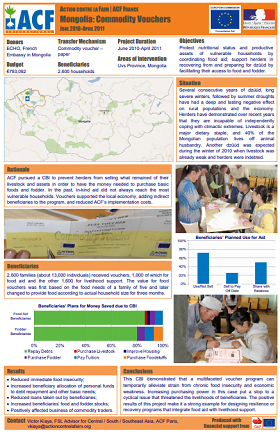
ACF Mongolia Commodity Vouchers (poster)
Report
This one-page poster provides an overview of ACF’s commodity voucher programme in Mongolia.

Impact Evaluation of Cash, Food Vouchers, and Food Transfers among Colombian Refugees and Poor Ecuadorians in Carchi and Sucumbíos
Report
This report is the final impact evaluation of the World Food Programme’s Food, Cash, and Voucher intervention and contains analysis on outcomes including food security, social capital, anemia, and gender issues. Due to the targeting of Colombian refuges and poor Ecuadorians in Northern Ecuador, it also...
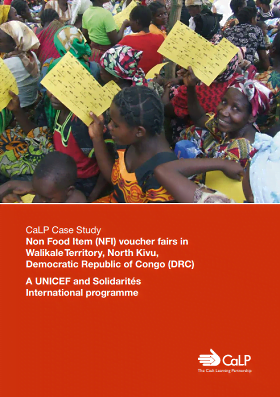
Non Food Item (NFI) Voucher Fairs in Walikale Territory, North Kivu, DRC (the CALP Network Case study)
Report
In response to a rapid-onset emergency, UNICEF and Solidarités International utilised a cash-based voucher approach in Nyasi and Bobolo villages, in WalikaleTerritory, North Kivu, Democratic Republic of Congo (DRC). As part of a larger multi-province, multi-partner response programme in DRC known as...

The Impact of Cash Transfers on Nutrition in Emergency and Transitional Contexts – Synthesis Paper
Report
Cash transfer programming is now widely accepted as a way to meet a variety of needs in humanitarian and transitional settings. Although the literature on cash transfers has grown exponentially over the last few years, as has their use in humanitarian interventions, the relationship between cash...
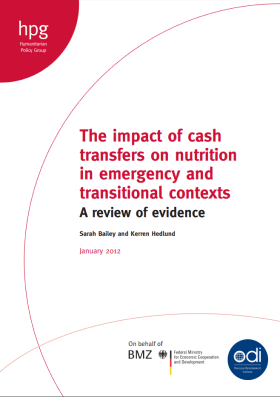
The Impact of Cash Transfers on Nutrition in Emergency and Transitional Contexts – Review of Evidence
Report
This ODI / HPG comissioned report reviews the evidence of the impact of cash transfers on nutrition in emergency and transitional contexts. The research finds that evidence from humanitarian evaluations makes a strong case that cash transfers often improve dietary intake.There is less evidence that cash...
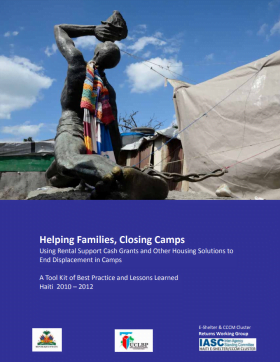
Helping Families, Closing Camps: Using rental support cash grants and other housing solutions to end displacement in camps
Guidelines and Tools
Rental Support Cash Grants have enabled over 14,000 families to move from Haiti’s displacement camps into safe housing. Since October 2010, ten months after the January 12th earthquake, these grants of $500 US Dollars covering one year of rent have proven to be a fast, effective and relatively...
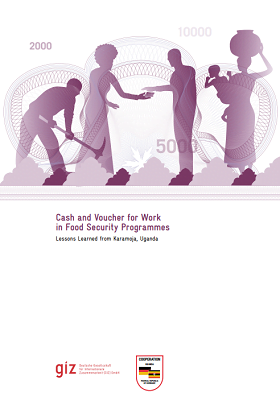
Cash and Voucher for Work in Food Security Programmes Lessons Learned from Karamoja, Uganda
Report
This report examines a Deutsche Gesellschaft für Internationale Zusammenarbeit (GIZ) GmbH supported labourintensive cash for work and voucher for work project which was implemented in the framework of GIZ’s Food and Nutrition Security and Conflict Management Project (FNS) in Karamoja. The FNS project...
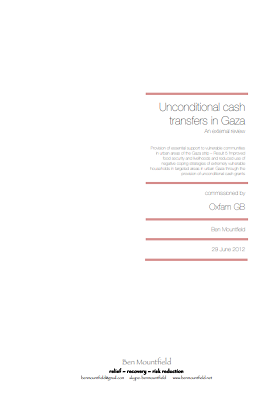
Unconditional cash transfers in Gaza: an external review
Report
This is a review of small pilot project, which targets extremely vulnerable households with monthly unconditional cash transfers for a limited period. The target population is made up of two groups, one group already receiving assistance through a voucher from WFP but still showing poor food diversity...

Examining Differences in the Effectiveness and Impacts of Vouchers and Unconditional Cash Transfers
Report
The objective of this study is to examine the differences in the effectiveness and impacts of vouchers versus unconditional cash transfers in the Bushani camp of the Masisi territory of the Democratic Republic of Congo. As part of this research, the study team collected household data from over...


